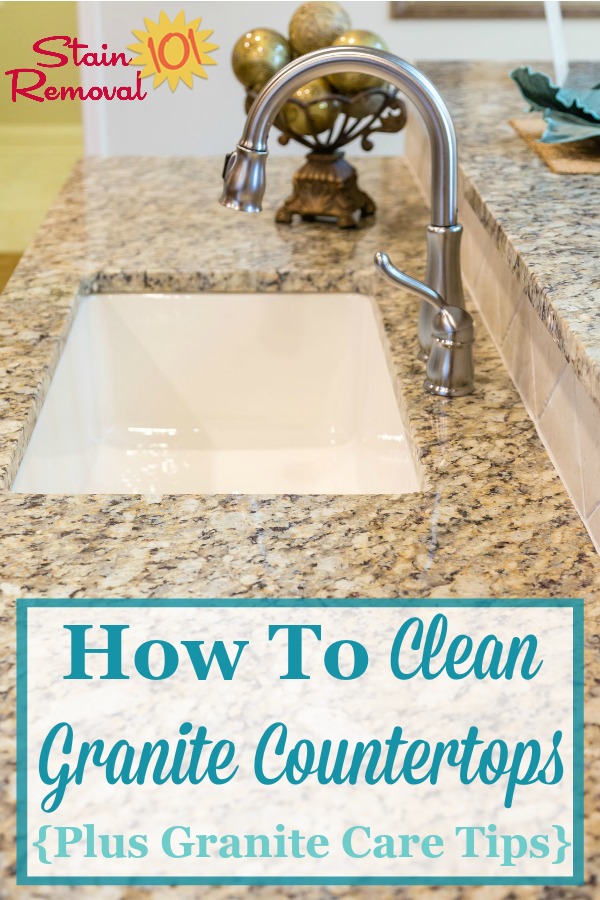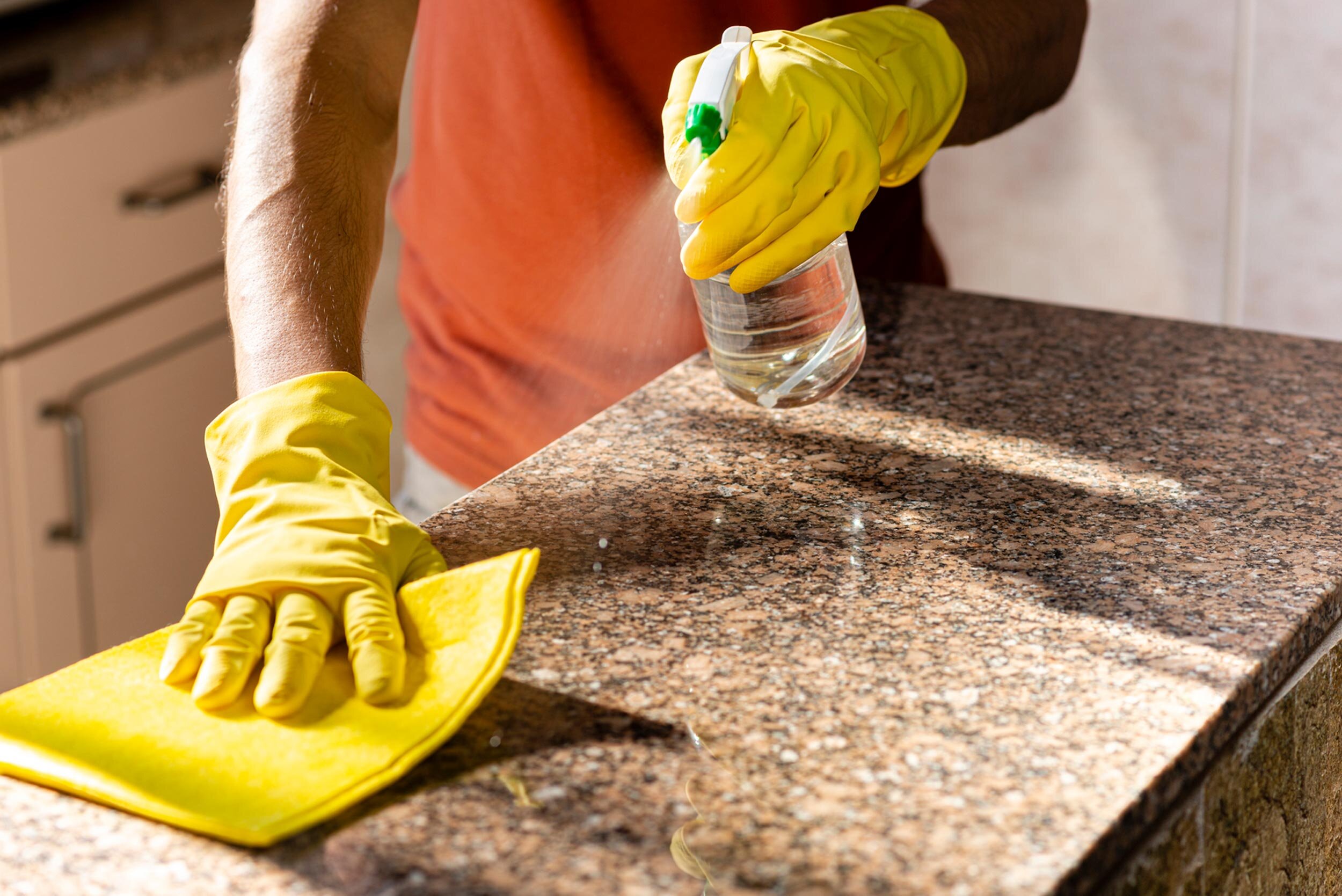Granite countertops are a popular choice for kitchens and bathrooms due to their durability, aesthetic appeal, and heat resistance. However, maintaining their beauty and longevity requires proper care and maintenance. This comprehensive guide will cover everything you need to know about caring for your granite countertops, ensuring they remain a stunning feature in your home for years to come.
Granite is a natural stone formed under high pressure and heat, giving it a unique blend of minerals that results in various colors and patterns. Its composition makes it incredibly durable and resistant to heat and scratches, but it is still porous and can absorb liquids, which can lead to stains if not properly sealed. Therefore, the first step in granite countertop care is ensuring that your countertop is adequately sealed. A good sealant prevents liquids from penetrating the surface, reducing the risk of staining.
To test if your granite countertop needs sealing, perform a simple water test. Pour a small amount of water, about a quarter cup, onto the surface and let it sit for 15 minutes. If the water beads up and remains on the surface, your seal is still effective. If the water seeps into the granite and darkens it, it’s time to reseal. Most granite countertops need to be sealed every one to three years, depending on the type of granite and the amount of use.
When it comes to daily cleaning, mild dish soap and warm water are your best friends. Use a soft cloth or sponge to wipe down the surface, ensuring you rinse thoroughly to remove any soap residue. Avoid using abrasive cleaners or scouring pads, as these can scratch the granite. Additionally, steer clear of acidic or alkaline cleaners, such as vinegar, lemon juice, or ammonia, which can dull the finish and weaken the sealant over time.

For deeper cleaning, consider using a granite-specific cleaner. These cleaners are formulated to clean the stone without damaging the sealant or causing streaks. Simply spray the cleaner on the surface and wipe it down with a soft cloth. Regular use of a granite cleaner can help maintain the stone’s natural shine and luster, keeping your countertops looking as good as new.
Granite is heat resistant, which means it can withstand hot pots and pans without getting damaged. However, it’s still wise to use trivets or hot pads to protect the surface from thermal shock, which can cause cracks. Similarly, while granite is scratch-resistant, it’s not scratch-proof. Avoid cutting directly on the surface; always use a cutting board to prevent scratches and maintain the polished finish of your countertop.
One of the most common issues with granite countertops is staining. While a properly sealed countertop is highly resistant to stains, certain substances can still pose a risk. Spills should be wiped up immediately to prevent them from seeping into the stone. Substances like red wine, coffee, oils, and acidic foods can cause discoloration if left on the surface for too long. If a stain does occur, a poultice made of baking soda and water or a commercial granite stain remover can be used to draw out the stain.

In addition to cleaning and stain prevention, regular maintenance of the sealant is crucial. As mentioned earlier, resealing should be done every one to three years, but high-traffic areas might require more frequent attention. When resealing, thoroughly clean the countertop and let it dry completely before applying the sealant. Follow the manufacturer’s instructions for the best results, and ensure the area is well-ventilated during application.
Etching is another concern for granite countertops, though it is less common than staining. Etching occurs when acidic substances come into contact with the stone, causing a dull spot or a change in the surface’s texture. While granite is less prone to etching than other natural stones like marble, it’s still important to be cautious with acidic foods and cleaners. If etching does occur, it may require professional polishing to restore the surface.
Water rings and spots can also be an issue, especially around sinks and faucets. These spots are typically caused by hard water and can be removed with a mixture of baking soda and water. Apply the paste to the affected area, let it sit for a few minutes, then gently scrub with a soft cloth and rinse thoroughly. To prevent future water spots, dry the area with a towel after use.
Granite countertops can sometimes develop small chips or cracks, particularly around edges and corners. To minimize the risk, avoid banging heavy pots and pans against the edges. If a chip or crack does occur, it can often be repaired using an epoxy resin that matches the color of your granite. For larger or more noticeable damage, it’s best to consult a professional stone repair specialist.

Another important aspect of granite countertop care is protecting the stone from direct sunlight. Prolonged exposure to UV rays can cause some types of granite to fade or discolor over time. If your countertops are exposed to direct sunlight, consider using window treatments like blinds or shades to minimize exposure.
Granite countertops in bathrooms require similar care to those in kitchens, with a few additional considerations. Hair products, perfumes, and other toiletries can cause stains or damage the sealant. Always use a tray or mat to keep these items off the countertop and wipe up any spills immediately. Regular cleaning and sealing will help maintain the stone’s beauty and durability in these high-moisture environments.
Maintaining the grout or caulking around your granite countertops is also essential. Over time, grout can become stained or damaged, leading to water infiltration and potential damage to the countertop and underlying cabinetry. Inspect the grout regularly and repair or replace it as needed to ensure a watertight seal.
Finally, education and awareness are key to maintaining granite countertops. Make sure everyone in your household knows the dos and don’ts of granite care. Simple habits like using cutting boards, trivets, and coasters can go a long way in preserving the beauty and functionality of your granite countertops.

Common Mistakes to Avoid
One common mistake is using harsh or abrasive cleaners on granite countertops. These can scratch the surface and damage the sealant, making the stone more susceptible to stains and etching. Always opt for pH-balanced, granite-specific cleaners to ensure the longevity of your countertops. Another mistake is neglecting to reseal the countertops regularly. Over time, the sealant wears off, and if not reapplied, the granite can absorb liquids and become stained. Make it a habit to test the sealant’s effectiveness periodically and reseal as needed.
Cutting directly on granite is another frequent error. Although granite is hard and scratch-resistant, cutting directly on it can dull your knives and potentially leave scratches on the surface. Always use a cutting board to protect both your knives and your countertop. Additionally, placing hot pots and pans directly on the granite can cause thermal shock, leading to cracks. Even though granite is heat resistant, using trivets or hot pads is a better practice to avoid any risk of damage.
Failing to clean up spills immediately is another mistake to avoid. Substances like red wine, coffee, and oils can stain granite if left to sit on the surface. Promptly wiping up spills can prevent these substances from penetrating the stone and causing permanent stains. Also, using vinegar, lemon juice, or other acidic cleaners can etch the surface of the granite, dulling its shine and damaging the sealant. Stick to mild dish soap and water or a granite-specific cleaner for routine cleaning.
Lastly, ignoring minor chips or cracks can lead to more significant problems. Small chips can grow larger over time if not repaired, compromising the integrity and appearance of the countertop. Using an epoxy resin for minor repairs or consulting a professional for more significant damage can keep your granite looking its best.

How often should granite countertops be sealed?
The frequency of sealing granite countertops depends on the type of granite and the amount of use. Generally, it is recommended to seal granite countertops every one to three years. To determine if your countertop needs sealing, perform a water test by pouring a small amount of water on the surface and letting it sit for 15 minutes. If the water beads up, the seal is still effective. If it seeps into the granite and darkens it, it’s time to reseal. Regular sealing helps protect the granite from stains and moisture damage, maintaining its appearance and longevity.
What is the best way to clean granite countertops daily?
For daily cleaning, use mild dish soap and warm water. A soft cloth or sponge is ideal for wiping down the surface, ensuring you rinse thoroughly to remove any soap residue. Avoid using abrasive cleaners, scouring pads, or acidic/alkaline cleaners like vinegar or ammonia, as these can scratch the granite and weaken the sealant. For deeper cleaning, a granite-specific cleaner is recommended. These cleaners are formulated to clean the stone without damaging the sealant or causing streaks, helping to maintain the granite’s natural shine and luster.
Can granite countertops get stained, and how can stains be removed?
Yes, granite countertops can get stained, especially if they are not properly sealed. Spills should be wiped up immediately to prevent them from seeping into the stone. If a stain does occur, a poultice made of baking soda and water or a commercial granite stain remover can be used to draw out the stain. Apply the poultice to the stained area, cover it with plastic wrap, and let it sit for 24 hours before wiping it off and rinsing the area. Regular sealing and prompt cleanup of spills are crucial to prevent staining.

How can I repair minor chips or cracks in granite countertops?
Minor chips or cracks in granite countertops can often be repaired using an epoxy resin that matches the color of your granite. Clean the area thoroughly, apply the epoxy resin, and smooth it out with a razor blade or putty knife. Once it cures, the repair should blend in with the rest of the countertop. For larger or more noticeable damage, it’s best to consult a professional stone repair specialist. Regularly inspecting and addressing minor damage promptly can help maintain the integrity and appearance of your granite countertops.
What precautions should I take to prevent scratches on granite countertops?
To prevent scratches on granite countertops, avoid cutting directly on the surface and always use a cutting board. While granite is scratch-resistant, it is not scratch-proof, and using a cutting board protects both the countertop and your knives. Additionally, avoid dragging heavy pots, pans, or other objects across the surface, as this can also cause scratches. Using trivets or hot pads under hot cookware can prevent thermal shock and potential cracks, further protecting your granite countertops.
Are granite countertops heat resistant, and can I place hot pots on them?
Granite countertops are heat resistant and can withstand hot pots and pans. However, it’s still advisable to use trivets or hot pads to protect the surface from thermal shock, which can cause cracks. While granite can handle high temperatures, sudden changes in temperature can stress the stone. Using trivets or hot pads ensures that your granite countertops remain in excellent condition, preventing any potential damage from hot cookware. Regular maintenance and proper care practices are essential to preserving the beauty and functionality of your granite countertops.

How to Care For Your Granite Countertops – Use Natural Stone

Related articles:
- Granite Countertop Overlay
- Stains On Granite Countertops
- Black Pearl Granite Countertops
- Black Matte Granite Countertop
- Black Granite Kitchen Countertops
- Cutting Granite Countertops DIY
- Gray Granite Countertops
- Blue Gray Granite Countertops
- Granite Countertops Wood Island
- Backsplash Ideas For Granite Countertops